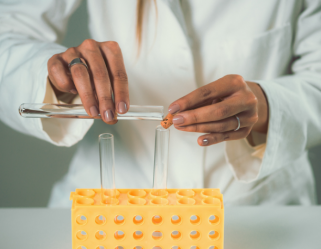Homeopathy and
Scientific Evidence
Does homeopathy work?
The questions surrounding the efficacy of homeopathy usually stem from inconsistencies experienced in achieving curative results from homeopathic treatment. Some people feel the positive effects of treatment quickly, some find only partial relief, whilst others feel little or no change at all. This range of experience can quite possibly be attributed to the challenges a homeopath faces in prescribing the correct treatment to the individual, taking into account not only the patient’s complaints and symptoms but also their personal circumstances, so as to provide a holistic assessment. By way of example, there are more than 700 homeopathic remedies for the common complaint of headache; unless a diligent prescriber considers the remedy based on aetiology, the exact nature of a patient’s headache, location, causation, the quality and frequency of pain and factors which make it better or worse, such remedy would not necessarily be the correct one. Therefore, differentiating minute aspects of the headache remains a fundamental exercise for the homeopathic prescriber.
Due to the nature of the individualised assessment that has to be made, it is quite easy to understand how two homeopaths may provide differing approaches for a seemingly similar ailment. This also highlights the challenges in making an accurate assessment and associated treatment plan, and of course is to a large extent dependent on the skill and diligence of the prescriber. A carefully considered, accurate treatment regimen would almost certainly work.
Is homeopathy supported by scientific evidence?
In classical homeopathy, the uniqueness of the individual is the key to prescribing treatment effectively. The entire individual is considered with just as much importance as the medical illness itself. This means that the effectiveness of homeopathic intervention can only be assessed successfully through trials that are in tandem with the way homeopathy is practiced clinically. Realistically this means that variance in the mental and emotional states and diverse constitutional makeup of the trialing individuals will always be an impediment to designing a “gold standard” clinical trial that is necessary to scientifically endorse the effectiveness of homeopathy. However, a growing body of research based on biological experiments conducted in laboratories has significantly explained the physicochemical properties of homeopathic remedies and their mode of interaction with biological systems to cause detectable effects.
Biological pathways and homeopathic remedies
In recent years laboratory research (in vitro studies) has been conducted and published in peer reviewed journals explaining the biological pathways for the healing properties of homeopathic remedies, for example, Arnica is a popular homeopathic medicine, known for its therapeutic properties in healing bruises, swellings, inflammations and wounds associated with trauma. In a research study conducted by professors from the Department of Medicine, University of Verona in Italy, the biological action of Arnica on tissue formation and repair has been investigated. The study concluded that Arnica as a component of homeopathic medicine had a positive effect in relation to cell adhesion and migration during tissue development and healing, on cultured cell lines in the laboratory. Further, a mechanism of action of Arnica has been demonstrated by advanced genomic methods. Similarly, many other remedies have also been the subject of research studies with similar explanations.
Where does homeopathy stand today?

The practice of homeopathy is more than two hundred years old and is used by tens of thousands of physicians and over five hundred million people worldwide, making it one of the more popular forms of alternative medicine. It continues to provide successful outcomes to a wide range of conditions using traditional and newer approaches to practice, and is further expanding into integrated health care. Homeopathy is responding effectively to patient-centred issues, and has moved on in its scope, both in the range of conditions treated successfully and in the demography of our patients.
Researchers around the world are investigating the mechanism of action of homeopathic medicines, which is likely to be based in physics rather than chemistry. That is due to the manufacturing process, where homeopathic medicines are vigorously shaken repeatedly, introducing kinetic energy. This process is thought to be responsible for making the final product biologically active, despite being highly diluted. Many laboratory studies have shown ultra-high dilution homeopathic medicines to have biological effects. These are exciting results and are generating a number of specific and encouraging lines of investigation.
In recent years, the debate has moved on from “does homeopathy work?” to “how does homeopathy work?”. Looking ahead, it is hoped that the evidential basis for homeopathy continues to build to the point where this arm of medicine acquires its rightful place within integrative health care.
